#motivations are complicated and a product of history
Explore tagged Tumblr posts
Text
Been working on another Elden Ring breakdown of notable observations in a specific location. With all the corpses strewn about, sometimes it feels like solving a murder mystery, or in general some other kind of "whodunit" puzzle. Then I remembered that the story trailer for Elden Ring has always pointed at basically that.
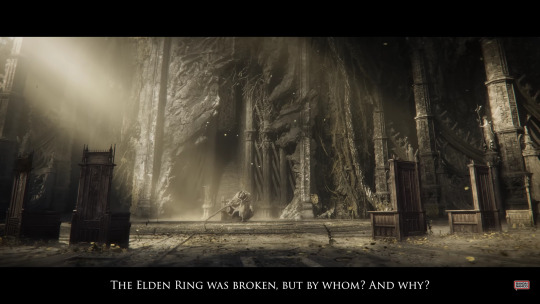
Means, motive, and opportunity are the three main indicators of suspicion for an investigation. For the breaking of the Elden Ring in particular we are told the means explicitly just for making it to the end: Marika's Hammer. We are also told in the item description who did it: Marika. In this way bypassing the need to guess a perpetrator based on opportunity. So all that remains is the motive.
That is what the game is asking the players to do. Maybe even more specifically, this is what Ranni is asking the players to do. Review all of the evidence scattered throughout the Lands Between to figure out Marika's motive for Shattering the Elden Ring.
It's a "whydunit" story.
#elden ring#media analysis#figuring out why any of the demigods were driven to fight and kill in the shattering war is another component to the story#their reasons are all tied to Marika's motive anyways#stuff like this is why I roll my eyes at people who say there is no story - a murder mystery investigation is a type of story#writers need to know the motivations of their characters but they don't always directly tell the reader in simple terms what these are#motivations are complicated and a product of history
17 notes
·
View notes
Text
Octavian: Final Thoughts
I don't actually think this is the last time we will discuss Octavian on this blog. However we've had a lot of good discussion about his character so I wanted to finalize my thoughts on the subject so that I have a reference I can look back on going forward.
Facts
Octavian is not 100% Evil:
Octavian is a child.
Octavian is a product of the culture he was raised in.
Octavian has reason to believe that the attack on New Rome was legitimate.
Octavian has reason to believe he is doing what the gods want.
Octavian is Definitely Guilty of:
Warmongering
Seeking power.
Being a jerk.
Octavian Might (Not) Have:
Killed Gwendolyn
Blackmailed Hazel
Prophetic Abilities
Been manipulated by Gaea
Intentionally allowed Bryce back into the military despite his questionable history.
Octavian's Narrative Function
An entrenched power for Percy, Hazel, and Frank to overcome. (But they already had the giants to overcome and didn't need a secondary antagonist.)
To make Hazel, Percy and Frank's quest more difficult. (His only opposition was in not giving them very much money and a crappy boat, but that could have happened whether Octavian was present or not.)
To make Reyna appear more sympathetic. (I feel like this could have been better handled a different way.)
To create a sense of urgency. (Again, there are other ways.)
Conclusions
Octavian Doesn't Make Sense
His actions, implied or directly stated, contradict his motives.
This could be because he's "complicated."
This could be because he's a plot device and Rick never intended him to be a "Real Character."
Octavian is Frustrating (Because)
He could have been "complicated."
Now I will never have the satisfaction of piecing his mysterious pieces together.
No one likes him.
I know how it feels to be unliked and the butt of everyone's joke. I don't like seeing people treated that way unless their truly irredeemable.
He doesn't make sense.
I can't even enjoy disliking him because he has no substance.
He serves no larger purpose.
The story would have been just as good as, or even better, without him.
Final Conclusion: Octavian is a poorly written character and an unecesarry plot device. We all cry for the villain he could have been. RIP.
#everything annoying#octavian hoo#octavian pjo#pjo#hoo#percy jackon and the olympians#heroes of olympus#pjo hoo toa#pjo critical#hoo critical#riordanverse#rrverse#final answer#reference post
110 notes
·
View notes
Text
Russia’s horrific casualties in its invasion of Ukraine, now estimated to have surpassed the combined total from all of Moscow’s wars since 1945, have put its infamous “meat grinder” tactics in the spotlight. Ukrainian soldiers have described waves of poorly armed, ill-prepared Russian troops thrown into battle as cannon fodder, leading to extreme rates of death and injury among the invaders. At the same time, Russian soldiers have themselves engaged in extreme violence—not only against Ukrainian civilians and prisoners of war, but also against each other.
Why are Russian troops, who are treated by their commanders as “disposable infantry,” willing to put up with and engage in such widespread brutality with so little protest? Fratricidal coercion, violence within units, and mistreatment among soldiers are not unique to the Russian military, but they have seldom been seen on this scale in recent decades. And while soldiers throughout history have resisted orders—most famously, U.S. soldiers engaged in so-called fragging against their officers during the Vietnam War—this sort of defiance is largely absent among Russian troops. The ongoing invasion of Ukraine, uniquely documented through widespread online coverage, reveals how an ingrained culture of violence in the Russian military fuels a brutal cycle of coercion and complicity.
There have been various attempts to explain docility among the Russian rank and file. Many focus on the financial incentives created by the war, including exorbitant enlistment bonuses (worth many times the average annual wage in some regions), soldiers’ salaries above the median wage, and compensation for families in case of death. Some observers have advanced sweeping cultural theories, suggesting that Russians are beset by a unique fatalism and nihilism. Others have argued that soldiers’ motivations may stem from a genuine belief in the conflict. Marlene Laruelle and Ivan Grek, Russia specialists at George Washington University, have argued that the war provides an opportunity for the “restoration of male self-worth” in a deeply dysfunctional society, creating a scenario through which “millions of Russians at the bottom of the social ladder can emerge as the country’s true heroes, ready for the ultimate sacrifice.”
But while financial and ideological factors help explain why Russians choose to enlist, they do not account for the continued acquiescence of soldiers once they face the meat-grinder tactics and systematic acts of violence perpetrated by their superiors and peers. Although some soldiers desert, the true number remains unclear. Many of those listed as AWOL are actually casualties, while other missing troops eventually return to their units. Nevertheless, most soldiers maintain a relative quiescence as they continue to face high casualty rates, a lack of equipment, and widespread mistreatment by commanders and fellow soldiers.
Soldiers’ compliance with such high levels of casualties and brutality can best be understood as a product of the pervasive and deeply ingrained culture of violence within the Russian military. This culture perpetuates a cycle that instills obedience and reinforces violence—as both victims and perpetrators—as part of a soldier’s identity. Repeated exposure to brutality, which is treated as normal and starts as soon as soldiers join the military, breaks down some of them to such an extent that they accept the tactics of their commanders without question. Brutal routinized hazing, extreme punishments, and other excessive violence is so routine that it becomes second nature to many Russian soldiers, enabling them to continue the cycle of extreme violence against Ukrainians and their own side alike.
Most militaries employ controlled, sanctioned forms of violence to prepare soldiers for the stresses of combat and to foster unit cohesion. For instance, the British Army’s Parachute Regiment engages in “milling,” which requires recruits to exchange repeated punches to the head. When unsanctioned hazing does occur in Western armies, efforts are typically made to combat it. In the Russian military, however, a particularly brutal tradition of hazing known as dedovshchina has been institutionalized into its very culture. This form of barracks violence, which occurs during the first part of a conscript’s military service, stands out for its severity and has become a central aspect of Russian military identity-building.
Within this system, recruits learn to endure and later carry out violence, becoming both its victims and perpetrators. Soldiers’ accounts describe treatment by senior conscripts involving extortion, beatings, and rape. Some have reported being forced into prostitution by senior officers. In one notorious case in the mid-2000s, a soldier was abused to such an extent that his legs and genitalia had to be amputated. In another, from 2018, a conscript allegedly killed himself after a demeaning expletive was cut into his forehead with a razor blade.
According to human rights activists, many suspicious suicides in the Russian military are linked to hazing and extortion, with some deaths suspected of being disguised as suicides to conceal murder. (The Russian military does not release official statistics on deaths among its ranks.) In 2019, a conscript stationed in Siberia opened fire on his unit, killing eight people, later explaining that he was driven to the act by the abuse that he suffered at the hands of his unit.
In Russia’s invasion of Ukraine, this deeply ingrained culture of violence persists—even though many soldiers are sent to fight on the front lines almost immediately after conscription or enlistment, leaving little time for training and for the typical cycle of dedovshchina to unfold.
Violence against and among soldiers continues to be a mechanism to maintain obedience. Russia has reportedly used barrier troops to kill or otherwise stop its own soldiers from retreating. Those who complain, step out of line, or ask to leave have been forced into “punishment pits,” placed in detention centers, or executed by their commanders. Outside the battlefield, drunken soldiers have killed civilians and each other. Indeed, soldiers turn on each other at rates we would not expect from a well-organized military; in an extreme case, a group of Russian soldiers tortured a fellow soldier to death after he attempted to curb their drinking and misbehavior. All this violence endures with relative impunity. When soldiers are extrajudicially executed or otherwise killed, their deaths have been disguised as combat casualties or desertion.
The Russian military’s use of violence against its own creates a cycle of behavior in which violence is routinized and internalized, conditioning soldiers to accept it as the norm and undermining their ability and will to dissent—whether out of fear, resignation, or the normalization of violence itself. Indeed, violence becomes a building block of soldiers’ identities, expectations, and self-expression. It’s an enduring legacy that spans generations: Both the Russian and Soviet armed forces have historically used fear and violence against their own recruits, civilians, and opposing soldiers in order to terrorize these groups into obedience or capitulation, respectively.
The result is twofold. Given their exposure to extreme violence and their inability to organize mass resistance, some soldiers feel powerless against the military, ultimately resigning themselves to their circumstances—whether those circumstances are being ordered to commit war crimes or deploy in a suicide attack—with minimal active resistance. While some might complain about their situations, most do not. This large-scale quiescence stems not from an acceptance of the military’s culture of violence, but rather from a fear of the consequences that it enforces. Knowing that the consequences of any dissent will be extreme, soldiers comply out of self-preservation, offering little resistance even when given orders that will all but certainly lead to death.
For another group of soldiers, however, this legacy of and repeated exposure to violence teaches them not only to acquiesce to violence, but also to actively participate in it, even to the extent that they defy the rules of war. Those who do engage in such brutality, such as one of the brigades accused of committing war crimes in Bucha, are often rewarded by the Russian government, which further normalizes and entrenches lethal violence in the Russian ranks.
Conditioned by a brutal military culture, Russian soldiers are trapped in a cycle of violence from which they are unlikely to break free. This has profound implications for the country’s invasion of Ukraine, now in its fourth year. First, since astonishingly high casualty rates have not prevented Russian soldiers from following orders, Russia is likely to continue its war of attrition, with Ukrainian soldiers facing more waves of supposedly disposable Russian soldiers sent to the front. Second, Russian soldiers will persist in their systematic repression of Ukrainians, committing human rights abuses and war crimes against civilians and prisoners-of-war.
As the world knows from the liberation of Bucha and Irpin—and from numerous testimonies of survivors of Russian violence—the Russian military continues to follow its policy of extreme brutality. Far from giving soldiers second thoughts about fighting, their own side’s violence only encourages them to follow along and perpetrate more of it.
23 notes
·
View notes
Text
the REDLINE manifesto
In honor of my second DIY screening of Redline, here is, at long last, a prettied-up version of my most popular reddit post, an unabashed love letter to my favorite movie. Most of this is probably less groundbreaking than it was when I first posted it a decade(!) ago, but whatever, the internet needs more Redline content anyway.

REDLINE Trivia
–JP stands for Joshua Punkhead, and in the very first draft he had 26 children and raced to pay off his child support. Also, the catchy moniker ‘Sweet JP’? English-only… the original Japanese gets the mouthful ‘very sweet weaponless prince’.
–You'd be hard-pressed to tell without looking into the lore a bit, but Miki & Todoroki are damn near the only actual humans in the movie; everyone else is some species of alien. Some are obvious, like Shinkai (Oceanic/Chikulun hybrid) and Trava (Anista tribe), but even the most human-like characters are some other race. Sonoshee, for example, is listed as being half human, half Oceanic tribe (海洋族).

The most curious case, though, is JP. While it'd be easy to assume he's human, there's a lot of details that don't add up: his unique elf ears, his super-lanky-even-for-a-Koike-character-design physique, the fact that his race is conspicuously redacted on his bail sheet… and his seeming immunity to death. Seriously, bro crashes every single thing he drives in the whole movie, then emerges unscathed with just a fiery flash of the eyes – that ain’t normal. If I had to wildly speculate, and I do, I’d put money that he’s somehow linked to Mikuru and the Giant species, as seen in Trava: Fist Planet. The physique matches, the Giants have displayed some preternatural healing abilities, and Trava lays the groundwork for a few other threads in Redline (namely, the existence of bioweapons and Shinkai & Trava’s past military experience), so there’s precedence. Maybe one day we’ll find out for sure…

–We all know and love Funky Boy thanks to the Roboworld president’s endless tirades. But the giant data-motivated crocodile monster Volton fuses with to engage Funky Boy in thrilling combat? She is a lady, and her name is Wire Girl.

–All of Redline’s vehicle and mechanical designs are nuts – they’re insanely complicated and filled with organic curves and details. Despite the immense difficulty of keeping such complex designs consistent, every mechanical shot is hand-drawn, without the aid of any CG. To help the animators stay on-target while drawing, the team made some sweet-ass production models for them to reference. What I wouldn’t give to own one of these…
–Before deciding on Redline being a film, writer Katsuhito Ishii and director Takeshi Koike considered making a TV series. Initial writers’ meetings saw the team fleshing out a comprehensive story bible about the setting: it included not only a wide-scope view of the universe and its history, but also detailed backstories for each racer. Even after deciding to make a feature film, Redline’s initial script gave each racer as much time and focus as the final cut gives to JP & Sonoshee; all of this was, unfortunately, cut for time. According to Ishii, though, much of this ancillary information made it into the novelization…

one day my Japanese will be good enough to read you ;_;
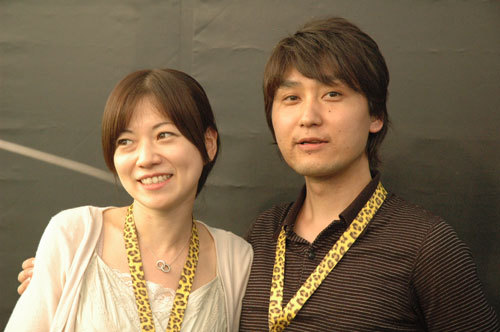
–Confused about why the movie ends with that sparkly, PowerPoint-ass ~LOVE~? Well, you shouldn’t be – Redline is ‘unabashedly dumb’, after all, per Ishii – but there is a little context. Over the course of the movie’s 7-year production, Koike and Yukiko (a producer on the film) fell in love, tying the knot in Switzerland just before Redline’s world premiere. If that doesn’t justify the ending for you, I don’t know what could.
–This isn't trivia but idk where else to put this stupid-ass Lynchman meme I made

Subtext you may have missed on first watch
–Machine Head is Sonoshee's estranged father?!
Crazy, I know, but hear me out.
First of all, Redline unambiguously shows the viewer that Sonoshee and Machine Head have some sort of pre-existing relationship, the nature of which isn’t explicitly clarified.

At the Oasis restaurant, Sonoshee tells JP she's waiting for someone; it may sound like she's simply brushing him off, but the moment Machine Head enters the scene, Sonoshee perks up and waves to him. When the Crab Sonoshee is flipped by missile fire during the Redline race, we get exactly two (2) Dramatic Anime Freezeframes: JP and Machine Head, implying those two, out of everyone, care the most about Sonoshee. During the final stretch of the race, as Machine Head prepares to pop his steamlight, he is not only aware that Sonoshee also has one, he taunts her about it:
“I see you still have your steamlight – got the guts to use it this time?”
JP even draws attention to the fact that Sonoshee’s looks identical to Tetsujin’s. Finally, though this is certainly ancillary, it is interesting to note that the exact moment Godwing loses its structural stability is right after JP declares he’s going to win because he, not Machine Head, has Sonoshee at his side.

So let’s line this up with what backstory we definitively know. As stated above, Sonoshee is a human / Oceanic hybrid; Machine Head, though his body has been modified beyond recognition, is referred to the same way. While talking to JP about the steamlight, Sonoshee says her father is the one that gave it to her, then describes him as a skilled racer who ran a junk joint. In that same conversation, when JP suggests she’s too focused on racing at the expense of personal relationships, she bristles and tries to end the conversation. During the flashback of young Sonoshee racing, her reaction to crashing is intense: she’s clearly holding herself to a higher standard, and is already dead set on racing in the Redline someday.
Now, there’s other plausible explanations for all this; maybe there’s just a romantic entanglement between Sonoshee and Machine Head, with JP barging in as the third vertex of a love triangle. But is that the most likely scenario for two people constantly characterized as putting racing before any personal matters?
No, I think Machine Head is Sonoshee’s father.

Picture it: Machine Head raised Sonoshee at his junk joint, so she grew up around racing and car modification. After seeing success on the circuits, Machine Head stopped being content with mere victory, and started spending all his time and energy modifying his body, pushing himself farther and farther. Sonoshee, feeling neglected and cast aside, turned to racing, seeing it as the only way to get her father’s attention. This lead to her perfectionism complex; if she’s not the very best, why would the King of Kings ever look her way?
Anyway, while it’s not confirmed in the text, I think there’s so many hints it might as well be. It makes JP and Sonoshee’s romance a lot more interesting, too. Their arc isn’t just two people falling in love, it’s about Sonoshee moving past the trauma of her father’s emotional abandonment and opening up to someone new. After JP explains his match fixing history in the climax, Sonoshee isn’t placated because he told the truth, she’s fired up seeing the strength of JP and Frisbee’s friendship: she sees the folly of chasing approval from her absent father, and that she could instead be forming bonds with friends who support her unconditionally. She can race for herself.
Koike and Ishii said Redline is about adult friendships, after all!

pictured: the most romantic kiss in cinema history
–The Redline race is, in fact, underhanded political maneuvering
Now, this one is sorta just The Plot Of The Movie, but I feel like there’s so much going on in Redline people often don’t connect these dots.
We all laugh at the Roboworld president’s hammy word salad:
“I wonder if this might be some kind of ploy by our enemies to infiltrate our borders. If that’s true, do you realize Roboworld’s military secrets could be at risk here? We’d be exposed!!”

…but he’s… kinda right, though?
At the time of the movie, the M3 Nebula has just emerged from two devastating interplanetary wars. The galaxy’s superpowers are under a tenuous peace agreement – one of the most important stipulations of which is a ban on the use and development of “bioweapons”, which in the Redline universe are less ‘weaponized bacterial strains’ and more ‘gargantuan synthetic monsters that can be deployed to wreak unthinkable destruction’. Despite this ban, the government of Roboworld has been continuing with bioweapon development unabated… and not only does Planet Supergrass seem to be aware of these violations, it really seems like they’re leveraging all their soft power to expose them.
Now, we know Supergrass is generally involved with the Redline final. As a member of the Redline Committee, they have a reason to be involved; they’re helping out with nuts & bolts logistical stuff, like transporting the racers to the course and prepping the finish line. But when you consider the significant, tangible political blows dealt to Roboworld by the race – Funky Boy and Wire Girl’s presumed destruction, Roboworld’s violation of the bioweapon treaty being broadly exposed to the public, the decimation of Roboworld’s military – the long string of coincidences that got us to that point start to seem a little suspicious.

Who pushed for the Redline final to be held on such a hostile planet? Who knew about Roboworld’s experimental orbital laser cannon – a project so tightly under wraps even their president only learns about it during the race – and hired contractors to sabotage it? Who organized a group of malcontents to attack both Roboworld’s power relay station and Funky Boy’s containment creche, right when such disruptions would be the most impactful? And who decided the race’s crucial middle stretch should go right over the restricted military zone housing said creche?
Supergrass has the motive and the means – plus, the race is already illegal, so what can Roboworld do, sue them about it? No sir, that Princess is on some subterfuge shit, and Secretary Titan, that shady fuck, is her inside man. And you can take that to the bank.
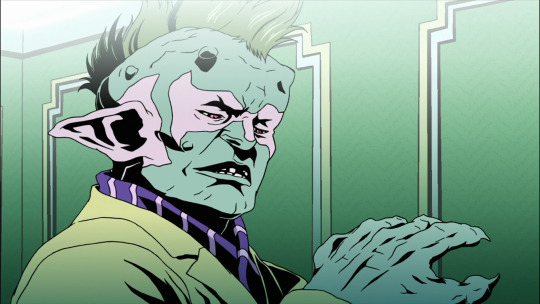
Craving more REDLINE?
Unfortunately, due to the movie’s commercial failure, there’s not much else in the franchise. The Redline production pilot is fucking sick, though, and there’s Trava: Fist Planet, an OVA by Koike & Ishii that predates Redline and focuses on Trava and Shinkai’s misadventures. While Trava never got the continuation it deserved, they did make a trailer for season 2... ahh, what could have been.
youtube
If you’re just after more of Takeshi Koike’s mind-blowing animation, there’s only a scant few projects in his trademark black-filled style. His most well-known work is probably the Samurai Champloo OP, or maybe World Record from The Animatrix (can’t find a link for that one, but y’know, do your thing). Koike also contributed animation to two other Ishii films: an extended intro for Party 7, and this aggressively horny dance sequence for Funky Forest. Back at Madhouse, it seems the studio liked to use Koike as a bait-and-switch, letting him direct lavish production pilots to secure adaptation rights then switching the staff up for the full production. Feels kind of scummy, but we got the immense Afro Samurai Pilot and Iron Man Pilot out of it. Finally, he made the series of Love shorts for SMAPxSMAP, the SMAP variety show, which are as dope as they are low-res.
dailymotion
I really wanna know if Koike was the one ballin out to CYNE and Gang Starr for this
—
And finally, as I threatened in my last post about Redline: let’s talk thematic depth.
~Thematic Depth~
In conversations online, Redline is often given this caveat of just being ‘eye candy’, or hit with the classic ‘style over substance’ cliche. Now, the phrase ‘style over substance’ has always bothered me, generally – it feels like it comes from folks who have never tried to make art before, who make light of the painstaking work and dedication that goes into creating anything – but it particularly frustrates me in animation. The process of animation is such an absurd, masochistic timesink that it’s a wonder anything ever gets finished at all; something this ambitious being finished, with this level of consistency and polish, is nothing short of a miracle, and to simply call that ‘style’ massively undervalues the whole endeavor.
Because, make no mistake, Redline is ambitious as hell from a visual standpoint. The consistent focus on kinetic motion and speed, buoyed by Koike’s masterful use of exaggerated perspective, spatial distortion, and dynamic camera work; lots of moving, hand-drawn backgrounds instead of matte pans; lively crowd animation in most scenes; remarkably expressive, constant character animation that imbues personality to every character and never settles for industry standard lip flap dialogue… and all of this using incredibly complex character & mechanical designs, many of which feature distinct alien physiology, and a rendering style with bold, detailed shadows that would be more at home in illustration than animation. It is truly a singular work.
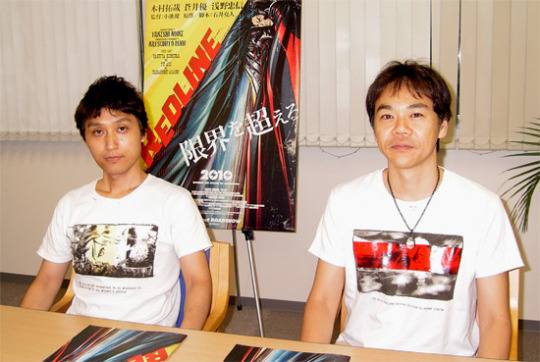


And the thing is, that wild ambition and unfailing dedication to the craft is the message.
The very first moments of Redline, before we see a single car or alien, are a brief series of title cards. I think most first-time viewers, and even many repeat viewers, immediately forget these words seconds after reading them due to the famously high-octane opening act. They read:
“In the far distant future, when cars are giving up their wheels in the changeover to air-cars, there still exist stubborn fools who carry on a vanishing spirit of racing…”

It’s easy to pass over this narration because, well, Redline simply isn’t about this conflict. We don’t see a single air-car racer, and there is no on-screen depiction of this purported old-school / new-school racing divide. So why is it here?
Because it’s the thesis of the whole damn project. Redline is about a group of old-school animation industry vets coming to terms with a changed industry that doesn’t support the type of art they want to create anymore, and their determination to pour their hearts into one last, stupid, beautiful swan song.

Madhouse was founded in 1972 by a group of ex-Mushi Pro staff, including Masao Maruyama and Yoshiaki Kawajiri. A response to Mushi Pro’s shoestring budgets and spartan timelines, the goal of studio Madhouse was to create production schedules where animators could flourish, rather than choosing the cheaper route; as Maruyama puts it, their mission statement was to ‘create animation other people aren’t interested in creating’. And, well, for decades, that’s what they did – Madhouse consistently gave a platform to idiosyncratic creators and produced incredible results. Their film canon includes pivotal productions like Kawajiri’s Ninja Scroll and Vampire Hunter D Bloodlust, Rintaro’s Metropolis, every single Satoshi Kon production from Perfect Blue to Paprika, and The Girl Who Leapt Through Time, the film that launched Mamoru Hosoda into stardom. While their TV output might be seen as more workmanlike, they were still dedicated to creating original stories. For example, despite his proven track record, Masaaki Yuasa was unable to secure funding and creative freedom anywhere else but Madhouse, with whom he produced Kemonozume, Kaiba, and The Tatami Galaxy prior to the establishment of Science Saru.

Takeshi Koike’s formative years as an animator were during this golden era of Madhouse. Poached directly out of high school by Yoshiaki Kawajiri himself, Koike was taken under his wing – his first job as a professional animator was inbetweening for Wicked City, and he’d moved up to key animation roles just one year later. I think Kawajiri’s intent was for Koike to be his protege; in this boom era of animation, with high-budget feature films and OVAs as the de facto standard, creative vision and a unique style is what you’d look for in an up-and-coming director, and Koike had both of these in spades. For a time, this pathway seemed almost assured; Koike’s big-league directing debut on The Animatrix produced one of its most well-received shorts, even amidst an anthology stacked with superstar creative talent.
Unfortunately, the turn of the millennium brought a lot of change for Madhouse and the industry at large. Budgets shrank, and production schedules started trending towards today’s unsustainable nightmare grind. CGI became ubiquitous not for the unique shots and compositions it allows for, but as a corner-cutting method for complicated actors like vehicles or mechas. A certain homogeneity and tendency toward ‘safe’, appealing designs and premises took hold; what good is your off-the-wall, creative worldbuilding idea when the anime industry revolves around merch sales, and generic moe waifus are outselling your original IP ten-to-one? All these industry vets could see the writing on the wall: animation would survive, but things were changing, and the ideals they’d founded their studio around were becoming untenable.
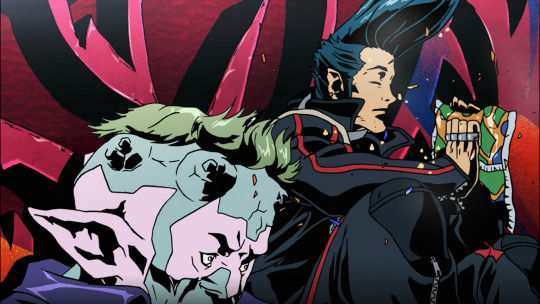
So I genuinely believe Redline is a parting shot from the old guard, a celebration of the era of the industry they cut their teeth on, one last lush, extravagant farewell before they passed the torch to the next generation. Maybe not from the start, sure, but after years of troubled development, progressing slowly due to the team’s meticulous vision, I think they rallied around the cause, dead set on making a masterwork, no matter what. Just look at the talent they attracted, the staff list reads like a best-of: Shinya Ohira, Hiroyuki Imaishi, Sushio, Yoshiaki Kawajiri, Sayo Yamamoto, Katsuya Yamada, Takafumi Hori.
And that’s where we come back to that opening message, about those stubborn fools. Suddenly, that movie chock-full of characters putting everything on the line for their passions feels a lot more personal. Koike is JP, the traditional [animation / racing ] purist who’s become an anachronism and just wants to be able to do things his way; Kawajiri as the God of Racing, who JP’s looked up to since he was younger, giving him one last thumbs as he achieves his goals; and Maruyama as Frisbee, putting his livelihood in danger to buy his team the time and money they need for one last gig, who wants to see his friend finish the damn thing on his own terms, just this once.
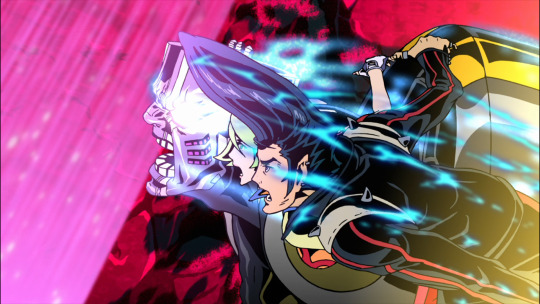
In a way, it makes it heartbreaking that Redline performed financially as poorly as it did; Japan’s frosty reception to the movie is at such odds with the fervor of its creators. But you know what? Redline exists, and it exists without compromises. They did what they set out to do. They made it across that finish line.
—
#will's media thoughts / virtual brain repository#redline#redline anime#takeshi koike#madhouse#long post#anime#redline 2009#movies
28 notes
·
View notes
Note
Hey, hope this is ok. I need some reassurance.
I've never felt a God's presence (except a vague warmth/peace when meditating about them sometimes I guess), much less talked directly to them (as in hearing them answer) and with so many people, esp on tiktok and here, talking like they have a private relationship with the Gods, a close friendship, even dating I just... I feel lesser I guess? Like so many people were chosen but not me and that must be a problem on my part. Like the Gods prefer everyone else over me. Like I'm not doing enough, even though I'm doing what I manage to do, given my limitations. I'm jealous of people who do communicate directly to the Gods. Part of me doubts them but part wants to believe them because it would be so shitty to lie about something like this and I don't want to believe these people are shitty. I don't believe non harmful hallucinations are all that common either, which would be the other explanation.
From what I understand you don't have this kind of direct communication either and I wanted to ask - how do you prevent yourself from feeling bad seeing all these people who (claim they) do?
I'm struggling here :( It's already hard for me to keep a consistent practice because of executive dysfunction and chronic illness and other stuff and this makes it harder. Feeling like I'll never be at everyone else's level of connection makes it harder.
Sorry for the vent-ish ask. You don't need to answer but I'm already glad if you read. Thank you.
Dear Anon,
Thank you for your ask, I am so sorry to hear that you are struggling. I want to tell you right off the bat that you are not lesser than any other worshipper - you are not less preferable to The Gods - and you should not feel any guilt around your spiritual/religious experiences. I would like to say the following to you, but also to the wider HelPol/Pagan community:
PLEASE Do Not Trust Spiritual Influencers on TikTok.
I cannot claim to know the legitimacy or the intentions/motivations behind every individuals actions regarding divine experiences, but I can say with confidence that most of the spiritual content on TikTok is dripping with lies and exaggerations.
Now, as someone with a mental health degree (I don't talk about my education often but I do have a bachelor's in Social Work and a minor in Psychology) I can also say with confidence that just because someone is lying doesn't mean they're necessarily a "bad person" but you don't have to be a "bad person" to have bad motivations.
Bad Motivations Can Include:
Lying for Financial Gain: This could be selling a product, selling a service, or trying to monetize on being an "influencer".
Lying for Attention: Many people do not have supportive friends, families, or communities - so as a maladaptive coping mechanism they will lie to get the attention they are lacking in their personal life.
Lying for Prestige: Some people don't feel important in their own lives, so they will lie so that other people will think that they are important.
Lying for Fun: In the age of the internet, the ability to make others believe something you know to be false can give someone an adrenaline or a dopamine rush. This is why "trolling" is still so popular.
And, not a "motivation", but still an explanation of why someone might "lie":
Mental Health Concerns: This could be a severe mental illness, a delusion, a hallucination, or conditioning from trauma.
People are weird and wonderful and diverse - and that diversity includes people who will lie (consciously or not) for a variety of reasons.
I speak about this openly as you mentioned, but I do not - nor have I ever - had any direct communication from any entity, deity, or spirit. Everything I know about my Gods (outside of myth, tradition, and history) I have learned through divination, ritual, and intuition.
Answering how I prevent myself from feeling bad when I see so many people "experiencing" something I can't - is a little bit complicated.
When I began my journey into paganism 11 years ago, TikTok didn't exist - Instagram was only 2 years old - and Tumblr had been around for a little under 5 years. My early knowledge came, mostly, from books. I wasn't comparing my experiences to those of others - because the only "others" I could compare myself to were limited to one high-school friend and the authors of the books I read. That kind of experience as a modern pagan doesn't really exist anymore because of how much the world has changed, but I wish it did. So, by the time I got to where I am now, the idea of comparing myself to others was so foreign. And as someone who grew up with the early internet - I learned very quickly that very little online is 100% real and truthful.
If you want to connect with your deities in an honest way that also feels real - you might enjoy trying one of the following (some of these might sound silly and/or childish - but if you truly want to grow as a pagan, you must throw away the idea that childish = bad):
Go outside at night and spin, put your arms out wide and spin and spin until you're dizzy (but not sick). Then lie down on the ground and close your eyes. That whirring sensation? That unreality of gravity? That is the Earth. That is Gaia. That is Demeter.
Listen to the rainfall on a stormy night. Sit somewhere you can hear the drops hitting the ground. Look and wait for a flash of lighting. The following thunder, that sound that you can feel in your bones that makes you jump, That is Zeus.
Write a letter to a friend, or to a loved one, or even to yourself in the future. Pay attention to how emotions become thoughts, thoughts become words, and words become writing. Communication - Language - Thought. That is Hermes.
I could go on- but at the end of the day, people are going to tell you that The Gods are "otherworldly"; but they're wrong. The Gods are of this world - The Gods are this world.
I hope that some of this has helped?
Eirene, peace and farewell,
- Aön
58 notes
·
View notes
Text
Top 6 shelved dramas that I would still really like to see
Ranked in no particular order, selection based on my personal tastes.
1) The Prisoner of Beauty

Plot : Adapted from the novel "Zhe Yao" by Peng Lai Ke, it tells the story of the arranged marriage between Wei Shao (Liu Yuning) and Qiao Man (Song Zuer). The fun thing about this marriage is that they both hate each other for complicated family reasons (in the novel Qiao Man's family is directly responsible for the death of Wei Shao's father), so they start they relationship by trying to make the life of the other a living hell. Ultimately, their relationship will develop as they are impressed by each other's ingenuity and discover common interests. There is also an important "let's protect the empire and the common people" plot behind the romance.
Why I wish I could see it : It looks good !! The main duo of actors are both really good looking, but the production in general looks really high budget, with good costumes and sets. I would love to see that. Just look at this trailer !
youtube
Why I am not seeing it any time soon : Song Zuer :/ bestie :/ tax evasion is bad !!
Can we have some hope ? : Not really, at this point of time, no c-actors caught for tax evasion managed to make an actual comeback in the industry (even really popular ones like Deng Lun or Fan Bing Bing). Song Zuer is still being investigated, so maybe we can hope to see her name cleared but it's a little unlikely because they don't investigate people just for fun. However Song Zuer was involved in a lot of high budget projects so I am sure a lot of people are really motivated to try to airdrop at least some of her projects if they have the possibility.
2) The Fated General

Plot : Classic high-budget historical drama telling the story of real life historical figure Huo Qubing (Zhang Ruoyun) during the Western Han Dynasty. It follows his military feats that got him the reputation of being one of the best military generals in the history of China.
Why I wish I could see it : First, the cast is incredible. We have Zhang Ruoyun (famous for being really good at choosing his scripts), Mao Xiao Tong, Bai Yu, Li Hongyi, Xu Yue, and others. It's really an all star cast except the drama was shot in 2016, before some of them became really famous, so it can be really interesting to watch ! Plus it's a really high budget drama, most of the outdoor scenes are shot in real landscape and not in a studio and it globally looks really good. For a better impression, look at this nice looking MV based on the different trailers of the show :
youtube
Why I am not seeing it any time soon : In 2019 (I think ?) the censorship rules changed concerning historical dramas and established the fact that dramas were forbidden to "distort" certain historical facts. This kind of put an end to traditional historical dramas as they became a way more risky investments, and stopped this one from airing as it already took some liberties in terms of storytelling. Huo Qubing is also a semi-controversial historical figure so it is not helping.
Can we have some hope ? : It's been 7 or 8 years and the regulations concerning historical fiction only got more restrictives in China so I would say no.
3) Immortality

Plot : I'm sure everybody knows the plot of Erha so I don't need to write it but just in case the important tags are : xianxia, dangai, shizunfuckers, reincarnation, blood spitting, stairs, ...
Why I wish I could see it : Outside of the obvious reasons (gay people on my screen, Luo Yunxi spitting blood), it's also produced by the same people involved in the production of Till the End of the Moon and Shui Long Yin, so I have I hopes for the artistic direction of the drama. Also for dmbj fans : did you know Liu Chang played a guest role in this drama ? Idk what he is doing here but I would love to see it.
Why I am not seeing it any time soon : We are all aware of the famous 2021 dangai ban, but in general the chinese government is not a big fan of massive and really agitated fandoms (in the way The Untamed fandom was), so Immortality is in a pretty bad position.
Can we have some hope ? : Yeah !!!!! Hyx TOMORROW !!! Believe in your dreams !!!
For real : Two options. 1) On a random morning of the year 20XX you wake up to danmei fans in your tl losing their marbles bc the 6 first episodes of hyx were randomly airdropped during the night with no promotion and no warnings. You cry some tears of joy and immediately go watch Luo Yunxi spit some blood on screen. 2) After many years hyx is still not out but there were so many leaks that the fans managed to recreate the entire series from scraps and now you can watch it in full. Look, they already started :
youtube
4) Night Wanderer

Plot : Zong Yin (Ni Ni) is a forensic expert living in Shanghai in 2021. She met, in her own apartment, a man, called Sheng Qing Rang (Deng Lun), claiming to be the owner of this apartment but in 1937. Together they discover that they can travel to their respective time periods through their shared apartment and start to develop a strong relationship, first as confidence and progressively as lovers. However, the situation get complicated as the Battle of Shanghai broke out in 1937 putting both of their lives in danger.
Why I wish I could see it : First, for lesbian reasons as I would never miss an occasion to stare at Ni Ni for 36 episodes (Wang Yuwen also has a supporting role here and I really like her ! Double win !). Second, it's actually a really nice and original plot for a CDrama and I have full confidence in both actors' capacity to pull off a really good performance to go with it. Look at this trailer ! It looks so promising !
youtube
Why I am not seeing it any time soon : Deng Lun !!! Tax evasion is bad !!
Can we have some hope ? : Even less than for The Prisoner of Beauty as Deng Lun is 100% proved to have committed tax evasion. There is often rumors about him coming back to acting but it's unlikely.
5) Winner is King

Plot : Based on the novel "Sha Po Lang" by Priest, set in a steampunk version of the Liang Dynasty. It tells the story of Chang Geng (Chen Zhe Yuan), a young man living in a random countryside village, who discovers after a raid on their village that the closest people around him were hiding a big secret about his identity. He also discovers that the people around him are not who they pretend to be, especially his yifu (adoptive father, played by Tan Jianci), and realizes that his life will never be the same.
Why I wish I could see it : Outside of the reasons already mentioned in hyx's case, Winner is King is also directed by the same director as Guardian and a Journey to Love. I really like his work and he proved that he was able to do really good things even with a really low budget, so now imagine with a decent amount of money ? It could be great. Also I really like the idea of an ancient china steampunk but I am too lazy to read the book.
Why I am not seeing it any time soon : Same reason as hyx and all the other dangais </3 Also I am not sure of how advanced the production was when it was stopped, because I feel like there are not as many content leaks.
Can we have some hope ? : If we can manifest hard enough the end of the ban, it is possible.
6) The Love of Hypnosis
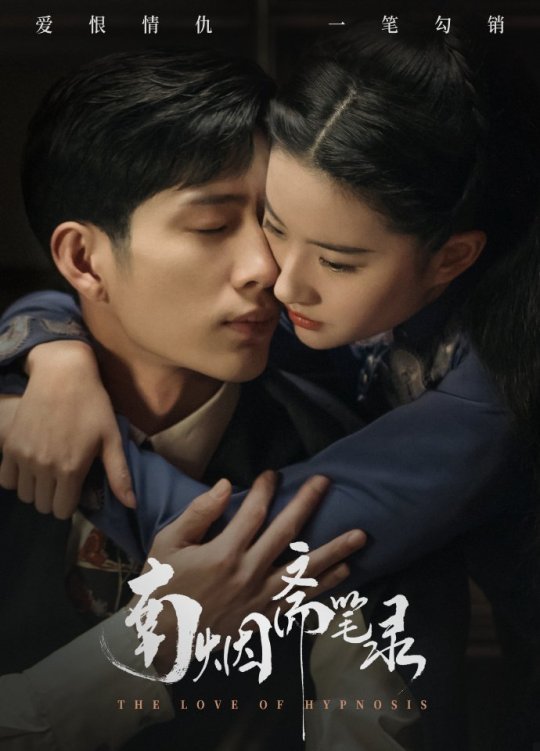
Plot : During the end of Qing Dynasty, a (patriotic) young man named Yen Shen (Jing Boran) meets a fragrance shop owner named Lu Man Sheng (Liu Yifei). Man Sheng has the special ability/ mission to relieve the hearts of people suffering because of love, but it does not mean that her own romantic life is easier to deal with. Together they fall in love and have to navigate the really troubled times of the end of Qing Dynasty.
Why I wish I could see it : If you are familiar with Liu Yifei and Jing Boran acting I'm sure you can see the potential of this pairing ??? Just the poster has more on screen chemistry than some pairings have in 40 episodes. At this point the plot could be written by a cat walking on a keyboard and I would still have hope for a good chemistry. Also the drama has Liu Mintao in a supporting role and I am in love with her so it's a plus.
Why I am not seeing it any time soon : First, there are some copyright issues with the original manhwa author. Second, the second male lead, Zhao Lixin, got more or less canceled a few years back for political reasons (sorry I don't have the details).
Can we have some hope ? : I would say maybe a little. Copyright issues can be solved and I've heard that Zhao Lixin is still shooting in dramas, meaning that there is hope for some of his stuff still being released.
That's all <3
Sorry for depressing information maybe ? Next time I promise I will make a post about dramas I am looking forward to and that are likely to be released sooner or later.
#cdrama#the prisoner of beauty#the fated general#immortality#hao yi xing#night wanderer#winner is king#the love of hypnosis#hitting my head against the wall
55 notes
·
View notes
Note
Hello ryin! I saw in a recent post of yours that you dislike the "class warfare" reading of the Havoc in Heaven arc in JTTW and would honestly love to hear more about your thoughts on that! Your takes have been really interesting.
Thank you!
My biggest problem with the "class warfare" reading is, first and foremost, what it has been historically used for.
Like, after the Havoc in Heaven opera and movie came out, the propagandists absolutely ate it up; SWK was associated with Mao Zedong and used to promote Mao's personality cult, and soon after, the White Bone Spirit story would be interpreted as this fable for the Sino-Soviet split.
Whereas Havoc in Heaven was intended and viewed as a metaphor and love letter to the victory of Chinese revolution, the White Bone Spirit story was interpreted in the context of the horrific fuck-up that is the Great Leap Forward, where the party were starting to doubt its leadership, and the path to the future seemed an uncertain and arduous one——much like the pilgrimage.
So, in the new twist on the "class warfare" narrative, Tripitaka and Pigsy became the poster-boy for "party members who were easily captivated by revisionist ideas" and needed to see how wrong they were, the WBS became the personification of Khruschev, imperialism, capitalism, revisionism...you name it, and SWK the Mao expy who could do no wrong yet was unfairly blamed by everyone.
Came the Cultural Revolution era, SWK would then become a sort of hero and role model for the Red Guards, smashing down all that was considered archaic and backwards, tearing down older authority figures and perceived "class enemies" alike, all the while emboldened by Mao's saying that "To rebel is justified" (造反有理).
Yeah, no, fuck that shit.
Terrible historical baggages aside, it is also a reading that reeks of presentism, and Lin Geng, a renowned professor of literature, had done a thorough takedown of the "SWK as peasant rebel" idea in his 西游记漫话.
Namely, it neither fits the circumstances of Havoc in Heaven, nor SWK's backstory and motivation. He's not rebelling because his monkeys are oppressed by the Celestial Realm, he's doing it because he feels personally slighted.
His mindset is also not that of a traditional peasant; compare and contrast that with Zhu Bajie, whom the author argues is very much peasant-coded in terms of his obsession with going back to Gao Laozhuang, his rake, and his comedic ignorance that stems from urban stereotypes of rural farmers.
To paraphrase Lin Geng, "Not all rebellions and rebel narratives in Chinese history are peasant ones, and we shouldn't just cry 'peasant rebellion metaphor!' the moment we saw a rebellion in fiction."
Lastly and more personally? This reading also tends to remove SWK's depth as a character. The representation of the Mind can be both heroic and flawed, capable of great feats and fuck-ups alike, but the representation of The Revolution has to be heroic and his opponents, whether celestial or demonic, must be evil oppressors and political boogeymen.
Like, the demons in the novel are representations of the mental obstacles a person will face on the path to Enlightenment, but they are also capable of being funny and very human characters, and not all of them wanted to eat Tripitaka.
The Celestial Realm is a satire of the imperial bureaucracy, sure, but the novel is also a product of its time and cannot magically promote 20th century ideas of revolutions and political reforms 500 years before they were a thing. Besides, SWK can still get help from them on the Journey and their relationship is more complicated than "oppressed rebel and oppressors".
And that's exactly why I dislike the "class warfare" reading: it creates a simplistic opposition of good and evil, and tries to squeeze the work into a narrow political framework that is neither nuanced nor accurate.
#journey to the west#xiyouji#jttw#chinese history#chinese literature#sun wukong#JTTWR has a pdf on his website about JTTW and PRC mythology-making#Lin Geng's book doesn't have a translation but can be found on WeChat read#Transforming Monkey also has a chapter that talks specifically about SWK's transformation into a revolutionary hero
37 notes
·
View notes
Note
"Aegon is injured and Aemond may or may not have something to do with the fact". This is what Aemond's actor said regarding ep 5. Therefore, we don't know for sure what Aemond wanted or didn't want to do at Rook's Rest so we are again in for a guessing game. And this is one of my problems with the show. They think they are being oh so mysterious and whatnot with this kind of "storytelling" but the truth is that it's just extremely frustrating. The characters have very little screentime (aemond has less than 3 minutes per episode ffs), a lot of important events are just skipped and what little we see is unclear and ambiguous so I have to guess or create headcanons. Like, sorry, but I'm not interested in this. Idk, this show and everything related to it just leaves me annoyed, confused or even angry. What's your experience regarding this?
I understand the annoyance and frustration over this aspect of the show because big part of my dislike for Fire & Blood comes from exactly that same reason. Is a fake story book that I don't even know if half of it is true or not with countless inconsistencies regarding war events and ambiguities about characters motivations.
And a adaptation can only be to a extension better or worse than the source material. So Ryan and his team, have in hands a complicated situation. I know he says to the public that he approached the material as being green propaganda. But he is lying, a lot of things he does with TB to me are prove of that. A lot of pr for House of the dragon is all about what they want you to believe for now what their intentions are. So if we take a lot of what they say in face value we are being lied to. So any HC you and I could created base on that is just end feeling like a betrayal and pointless.
But the final product speaks for it self more than the actors or Ryan or Sarah. Because they did lay ground for the conclusion of the story to be " in war there is truly never a winner" and one of the core of the story from George idea is to end with you questioning who was the right side or the dance.
They say for exemple the it was recorded dubious if Daemon or Aemond actions are intentional or not. But we also see they feeling guilty over it. S1 had a big discussion on the fandom over Daemon taking Rhaenyra to the brothel was intentionally done to tarnish her honor or not, and this season we see him feeling guilty over it, same with B&C same with Aemond and Luke's situation.
Whatever, if this is intention to adapt the the questionable reality of book or make people speculate who is justified or not. That end up just add to a theme on the show,in witch, is about how the intentions don't matter and will not matter in the end. Viserys all him wanted was have a peaceful family life but as Alicent said "he intentions died with him" and that goes for all characters.
Aemond always felt he deserved the crown more than Aegon, maybe he wanted to hurt his brother but he is willing to pay the price of killing his own brother and become the monster that history eventually will paint him to be? That is what they are trying to say with Heleana asking him that and Alicent growing fear of what her son is becoming.
So I will say that my problem with this subject is way less annoying in the show than in the book and while in part I find fun to speculate over those dubious thing they do, I also feel uncertaint over what they will do with those characters, this season I am very scared of the possible out come for Alicent as character. And I certainly despite the fandom discourse that is generated by the "open in the air" scenes. I think that is the factor that frustrating me the most. Because there was a time where was fun to engage on public conversations about media. But HOtD fandom is so toxic and lack any media literacy that even end up affecting how I sometimes interact with the fandom and watch the show.
And that is a big irony of it all because I sure despite Ryan intensions and how he will end the show. The fandom will not change their mind of who is the true winner/justified and what the story is about.
#house of the dragon#hotd#team green#aemond targaryen#pro aemond targaryen#daemon targeryan#hotd critical#Anti fire & blood#Anti HOtD#anti hotd fandom#Anon ask#anti ryan condal
10 notes
·
View notes
Note
what do you think about rook's character in ben 10 in general?you know I never really liked that he was this serious and workaholic partner from beginning to nearly the end,in Wikipedia says he's kinda ben's other best friend too but they hardly had a memorable scence for that together maybe except 1 or 2,and also he has scenes where he mocks ben seriously which I didn't like,idk it feels like his character is so unexplored he had more potential to him since he was ben's partner replacing gwevin in OV so just wanted to know your opinion👍🏻
I've already put all of my thoughts about Rook into my fics. Namely, Separately (S2-era Rook, who would disrespect Ben's boundaries purely for his own curiosity and then feels like shit for it), In All The World... (pre-canon Rook, and how/why I think he grew to idolize Ben and become a Plumber), Cross Your Heart (and Hope to Die) (puts Rook through absolute hell to break him down into one of the rawest character studies I've ever done), and Diamonds Are Forever (post-canon fic that explores the kind of person Rook is and how Ben has changed who he wants to grow to be/how Rook defines himself without Ben around).
But I know that's a lot to read, so here are the SparkNotes:
Rook mellows out a lot by season eight. This change is incredibly noticeable if you watch two episodes back-to-back.
Ben and Rook are very close, and this is something else you can see if you watch season one and then season eight to compare.
I think Ben and Rook had plenty of memorable scenes/moments. Their fake fight in season one, Rook being pushy during Showdown and later apologizing for it, "I don't always get him, but he's cool." "The feeling is mutual.", Rook physically holding Ben back from attacking someone (twice, lol), Rook fighting Lord Transyl's mind-control to warn Ben, "I have worked with Ben long enough to know that when he foolishly charged headlong into a trap, I should have foolishly charged after him.", Ben meeting Rook's family, literally all of their interactions in The Vengers, "Ben! I made a wisecrack!", acting like proud parents after Young One's tail fell off, Rook's promotion to Magister (and their successful fist bump!!), "It has been an honor to fight at your side," (Rook using his final words to tell Ben how important their partnership has been to him and that he doesn't regret a thing just does something to me), etc. If you don't think they're as iconic as Ben and Kevin, that's fair, but they do objectively have plenty of relationship-defining moments.
Rook has scenes where he mocks Ben. In early seasons, this is a character flaw. In later seasons, this is a product of the Omniverse writers thinking it's funny when the punchline to a joke is, "Ben's an idiot." If I held it against Rook, I'd have to hold it against literally every character... So I ignore it, lol.
Here are some episodes that I think do a good job of exploring Rook's character.
S2E6: Bros In Space
S2E7: Arrested Development (not a character-heavy episode, I just think Rook is really funny in this one.)
S3E2: Tummy Trouble
S3E8: While You Were Away ("You have become a hero while you were away," just makes me grin like an idiot every time.)
S3E10: The Frogs of War: Part 2
S4E2: The Ultimate Heist (I loved the scene towards the end where Albedo called Rook out on his willful ignorance.)
S4E8: OTTO Motives
S6E1: Catfight (Another one where Rook is really funny.)
S7E2: Rook Tales (Rook's fight with Kundo is iconic as hell to me. "You taught me everything you know. But we are not in your training hall anymore.")
S8E6: The Final Countdown
S8E10: A New Dawn
Rook is not an overly complicated person. He's a solid guy who gets character development and learns to loosen/open up. He's not as nuanced as Kevin. He doesn't have the history with Ben that Gwen does. But Rook is not a bad character by any means, and his bond with Ben feels earned.
But if you still aren't impressed with Rook, you can always rewatch UAF :p
#ben 10#ben tennyson#rook blonko#my writing#ben 10 discussion#ask#anonymous#Rook isn't as obviously flawed as Kevin is so you have to actually Look and Pay Attention to see his character development#but it is definitely there#S8 Rook and S1 Rook are two totally different people
23 notes
·
View notes
Text
Studyblr Intro ??

I’ve had this studyblr for quite some time now, though it’s seen little use. I’m back in school again and wanted to officially partake in the studyblr experience!
🌼 About me -
My name is Cassidy White
I’m a sophomore in college, currently in the process of sorting out my major (a little late, I know)
I have severe ADHD, depression, and anxiety! Fun!
I have a habit of trying to overcompensate for my ADHD by overanalyzing everything and trying to organize so much that’s it’s too overwhelming to use the nauseatingly complicated organizational systems I create.
🌼 Academics -
I started out as an Art Major?
Almost went into Art History
Ended up using my college’s unique program to individualize my major. Essentially I’m creating my own. It’s a combination of many semi-related things, focusing primarily on Psychology, Child Education, and Early Childhood Development.
🌼 Current classes -
Intro to Psychology
Early Childhood Education
Gender and Sexuality
Calculus 1
Sign Language 1
🌼 Interests -
Art history!! Symbolism, techniques, secrets, anything about an art piece that can be dissected into it’s smallest components and reveal something even more beautiful than the image itself. Especially if it’s basically a 16th century version of a shitpost.
Art in general? Creating it, I mean. I would never call myself good at it, but I enjoy it immensely and that’s enough for me.
Basically any physical craft? Pottery, bookbinding, sewing, knitting, woodcarving, resin, et cetera. I’m currently trying to build a dollhouse for my sister.
I really, really love writing! Though I have very little time for it. Still! My most often craved hobby!
🌼 Content -
Methods and tips for getting shit done when you have ADHD, depression, or anxiety
Aesthetics for inspiration
Positivity and motivation to keep going when you really don’t see the point in being in school anymore
Ideally, I’ll constantly be running some sort of “[NUMBER] days of productivity” thing
General tips for schoolwork. Essay writing, sourcing reliable materials, that sort of thing.
4 notes
·
View notes
Text

With her book The Return of Martin Guerre (1983), the historian Natalie Zemon Davis, who has died aged 94, attracted a wide readership and inspired future historians. It came out of working as a historical consultant on a film of the same name released the previous year, starring Gérard Depardieu and Nathalie Baye, and directed by Daniel Vigne.
Martin Guerre, a peasant farmer in the 16th-century Pyrenees, left his wife Bertrande to go on a journey, only to have his marital role usurped by an impostor who “returned” pretending to be him. After some years of cohabitation, Bertrande denounced the impostor, her testimony seemingly confirmed by the return of the real Martin Guerre. The impostor was duly tried and executed.
The film-makers’ questions about period detail and behaviour intrigued Davis. But other aspects of the movie genre troubled her, so she went back to the archives and wrote up her own compact account of 120 pages.
A gripping narrative and a lesson in method, Davis’s book raised questions about the reliability of evidence and the motives and worldviews of peasant men and women from a faraway place and time. It is an example of a microhistory, where historians turn away from the big canvas of kings, queens and battles to understand ordinary lives, often through a highly localised case study.
The Return of Martin Guerre was one of a series of works including Society and Culture in Early Modern France (1975), Fiction in the Archives (1987), Women on the Margins (1995) and The Gift in Sixteenth-Century France (2000). Davis’s trademark was the longer essay or biographical study, often focused on marginal or misunderstood personalities, all spiced with a sharp attention to issues of religion, gender, sex, class, money and power. Historical records for her were never dull: she once described them as “a magic thread that links me to people long since dead and with situations that have crumbled to dust”.
Born in Detroit, Natalie was the daughter of Helen (nee Lamport) and Julian Zemon, a textile trader, both children of east European Jewish immigrants to the US. While studying at Smith College, Massachusetts, at the age of 19 she fell in love with Chandler Davis, a brilliant mathematician and socialist activist; they married in 1948 and went on to have a son and two daughters. Her first degree, from Smith (1949), was followed by a master’s at Radcliffe College (1950).
Her life with Davis was productive and fulfilling but also complicated her early career, as his principled stances against McCarthy-era restrictions on political expression led to both him and her being barred from a number of posts, and from travelling abroad. This she needed to do for her doctorate on 16th-century France.
After finally gaining her PhD at Michigan University in 1959, Davis went on to hold positions at Toronto, moved in 1971 to the University of California, Berkeley, where she was appointed professor, and in 1978 to Princeton, retiring in 1996. She became only the second woman to serve as president of the American Historical Association (1987), and the first to serve as Eastman professor at Oxford (1994). In 2012 she was appointed Companion of the Order of Canada, and in the US was awarded a National Humanities Medal.
Davis helped establish programmes in women’s studies and taught courses on history and film. Her AHA presidential address, History’s Two Bodies (1988), summed up her thinking about gender in history. It was also the first such address to be printed with illustrations. Her book Slaves on Screen (2002) was one of the first in-depth treatments of this topic by a professional historian.
In her last two books, Davis returned to the exploration of mixed identities. Trickster Travels (2006) was about the 16th-century scholar Leo Africanus, whose complicated Jewish and Muslim roots in North Africa she expertly unpicked. Listening to the Languages of the People (2022) focused on the 19th-century scholar Lazare Sainéan, a Romanian-Jewish folklorist and lexicographer who published one of the world’s first serious studies of Yiddish, but had to abandon his Romanian homeland for Paris in 1901.
At the time of her death, Davis was completing a study of slave families in colonial Suriname: it is hoped this will appear under the announced title of Braided Histories. In this way she continued to explore unconventional topics, going against the grain of Eurocentric history and looking instead at the boundaries of identity and belonging in very different settings.
Visiting many universities and research centres in her retirement, Davis encouraged younger scholars by conveying the potential of history to inspire empathy and hope for change. While at my own institution, the University of Amsterdam, in 2016, she made it her main aim to talk to students rather than to other professors. In 2022-23 she presented her latest work in online seminars, and wrote and corresponded actively until shortly before her death from cancer.
Chandler died in 2022. Natalie is survived by her three children, Aaron, Hannah and Simone; four grandchildren; three great-grandchildren; and a brother, Stanley.
🔔 Natalie Zemon Davis, historian, born 8 November 1928; died 21 October 2023
Daily inspiration. Discover more photos at Just for Books…?
14 notes
·
View notes
Note
hey, i wanted to ask you, how did you get your start? i having been thinking about starting streaming/making videos for a while now, but i was always nervous about it. any suggestions. for a beginner?
I just answered the one about video essays so I'll talk about my streaming history!
4 years ago I was in college with a couple games I really wanted to play but I couldn't really balance it well without justifying a strict schedule and some kind of productive motivation. I decided streaming would be a good way to play some games every week, be social, and produce something in the process. When I graduated I made the push for affiliate, met some streaming buds, built a community, and that was that! There's some complicated stuff in the last couple years but the foundation of my channel was just a desire to play games and hang out with people, maybe make some people laugh, share the stories I like
6 notes
·
View notes
Text
While we're at it…
Duolingo has never been a platform that paid translators fairly. In fact, right from the start, they have shown zero respect for the translation industry and for the skills required to be a good translator. Their initial business model involved a crowdsourced translation service where they'd let language learners translate texts and then sell those translations to their clients (e.g., see this 2015 TechCrunch article).
Furthermore, the growth of Duolingo as a language-learning platform was only possible due to lots of naive language nerds who worked for free and helped create all those exercises through the company's Volunteer Contribution Program. That was a classic techbro asshole move on Duolingo's part: appeal to the good intentions of people with a passion for the subject/product, keep them motivated with lots of shallow talk about how their work will contribute to a brighter future where people have free access to knowledge and education, blablabla – and while all those well-meaning dummies worked for free, the people behind Duolingo were cashing in the big checks, getting investors involved, and planning the further commercialization of their product.

And make no mistake: The grand gestures they're now making, such as honoring those volunteers with fancy awards and VIP access to special events, and even the promised belated financial compensation to be distributed among all volunteers are just tiny drops in the bucket that won't hurt the company at all. And they won't undo all the exploitation that has been going on there for years. The partial switch to AI is just another non-suprising move following a long tradition of similarly profit-driven moves.
But they're not the only jerks out there doing this. Two more examples: Facebook (of course, eyeroll) and TED Talks. The latter's subtitles are also created by volunteers. And not only that: Many of those volunteers are actual translators (often with proper training and all) at the beginning of their career who unfortunately think that's a great way to build their portfolio and get some of that awesome exposure. But it is not. It's just a shitty way of helping all those rich tech companies get richer and further devaluing the translation profession. (If you happen to be a newbie translator reading this and looking to build your portfolio, do pro bono translations for people and organizations who really need your help!)
Obviously, this scheme is found in other fields as well, with people in creative industries being particularly vulnerable and gullible. Whenever someone promises your work will serve a greater good or provide you with career-boosting exposure, take a deep breath and then a close look at what kind of business or product you're about to support with your free labor. 9 times out of 10 you should be asking for real compensation.

And if you're a user of such products, 9 times out of 10 you should stop using them (and you should definitely stop paying for them).
But of course, life is complicated. Even if you should stop doing something, it's not always possible. Or at least not right away. (For example, I still use Facebook because of some non-public groups only found there.) But there's something you certainly can and must do: Pay more attention. Find out where your money is going, or, in the case of free services: Who will get your data, and how can they profit from them? Who's getting paid, and who's not getting paid? What's the history of the company or product? And do you really need it?
At least in some cases you will realize that you don't need the service or product at all.
AI in the form of large language models (LLMs) and generative algorithms used for tools like ChatGPT, Midjourney etc. increases this dilemma because it makes it even more difficult to find and use products whose creation didn't involve a lot of people getting exploited. And this will be the case for at least a while until the techbro hype has died down and people will learn to appreciate the value (well-paid) humans bring to a product or service. Lots of companies are currently trying to cut costs and corners by integrating these new AI models into their workflows. For some, it has already backfired (just ask the law firm Levidow, Levidow & Oberman about their little ChatGPT whoopsie); others will still learn this lesson the hard way. And of course, things will get reaaally fun when there's so much AI-generated content that the models will start ingesting too much of it, thereby poisoning themselves. Grab your popcorn, folks!

On a more serious note though: AI itself isn't the problem. It's an umbrella term that comprises a multitude of different methods and strategies, some of which are extremely useful (for example, in early-stage cancer detection). And there are many people, companies, and organizations that try to integrate AI into their workflows in a careful, cautious manner. You're already using lots of things in your daily life that wouldn't be possible without AI. Even your use of Tumblr is likely enabled by AI because fast internet requires smart routing of all that data traffic.
So from now on, when you look behind the scenes of how a tool or service gets provided, the mere fact that some AI is involved shouldn't be a disqualifier. You need to dig deeper. What kind of AI? What purpose is it used for? Does it actually help humans work smarter or does it force them to work harder?
There are problematic people on both ends of the spectrum: techbro bootlickers praising our AI overlords on one end, and uninformed luddites waving "boycott AI" signs on the other end. But a solution and a way out of this mess can only be found somewhere in the middle.
(Much more could be said about the use of AI/MT in the translation industry, how it's currently evolving, and how often people (unknowingly) support the exploitation of translators... Maybe in a future post...)
Heads up to not use Duolingo or to cease using it
In December 2023 they laid off a huge percentage of their translation teams, replacing them with ai and having the remaining members review the ai translations to make sure the translations are “acceptable” (Note how they use the world acceptable and not accurate)
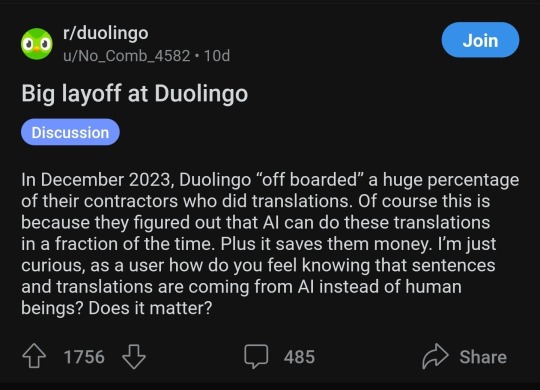
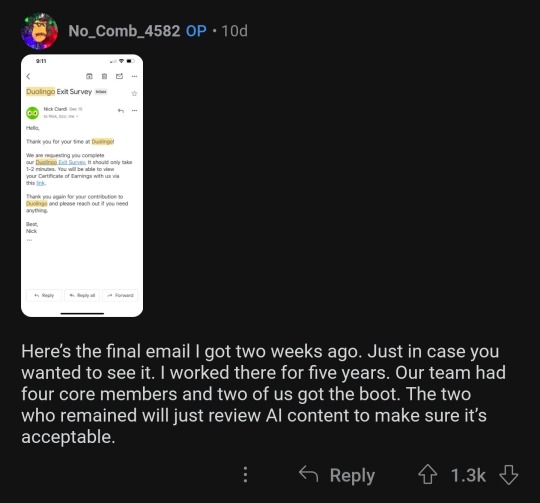
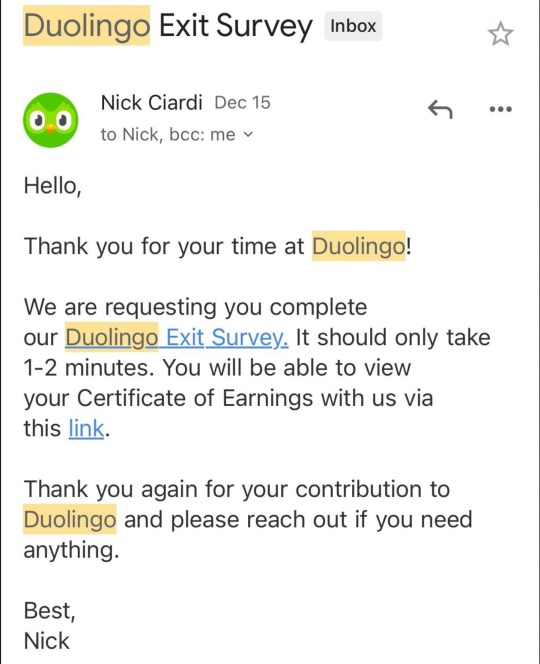
Link to the tweet that informed me of this:
https://x.com/rahll/status/1744234385891594380?s=46&t=a5vK0RLlkgqk-CTqc0Gvvw
If you’re a current user prepare for an uptick in translations errors as I’ve already seen people in the comments say they’ve noticed
#Duolingo#AI#XL8#special shoutout to efka-m#an unfinished email to you has been sitting in my drafts for ages#I promise I'll finish it some day#(maybe I should ask ChatGPT to help me? :-D)
44K notes
·
View notes
Note
I love your interpretations of AL-AN! What are your thoughts on how AL-AN speaks / communicates?
I imagine AL-AN as very very intelligent... to a point where he has to cut down everything he thinks. Not quite because he thinks lower of others intelligence, but moreso that Precursor thoughts are beyond anything that can be captured in language or communication. So everything he says isn't what he means, but rather whatever is close enough.
It does go the same way for him however, he can't quite fully understand whats going on as much as he learns about it, giving him a bit of obliviousness. Sort of like trying to imagine the viewpoint of a second-dimensional creature - We can make comparisons and simulations and come very close, but we'll never truly know, and likewise he will never truly know what humans experience even if he observes it.
Okay, okay, thoughts on Al-An speaking and communicating. So English isn't Al-An's first language. In fact, I'm not sure he has a first language. Architects are telepathic. They probably don't need to use words to communicate, they just transmit their thoughts directly using whole concepts. Using language adds an extra step he doesn't normally need.
Architects do have a written language, but I figure that's either a product from before they built a species-wide network to store all their information, or it's a programming language, for communicating with machines. Probably both. Either way, I don't think it involves using words as representations of sound. I think it's more like hieroglyphics, where each symbol or group of symbols represents a concept. It wouldn't be possible to read the Architect language aloud.
So Al-An using verbal language to communicate feels to him like he's writing something rather than doing his version of speaking.
He does have a couple of interesting verbal patterns though. He always uses a lot of overly complicated words instead of simple words (they are more precise, he protests!) like he downloaded a dictionary and then started using all the words in it regardless of how commonly they get used in actual everyday speech. This is fine with Robin because she has a PhD, and you don't get that far into college without having a good vocabulary, but it does make it difficult for fic writers sometimes (don't look at my thesaurus history!) He also never, not once, uses a contraction in the game (I checked.) It's always 'do not' instead of 'don't,' or 'I am' instead of 'I'm.' This may in fact be because he downloaded the dictionary and only knew how to use vocabulary contained in it. This is great because it provides an interesting tonal contrast every time he talks to Robin.
Also, when and how did he learn English exactly? I figure he couldn't have been completely cut off from the outside world in that cube. Sensory deprivation for a thousand years while still conscious the whole time would be hard on any species, no matter how advanced. It might be moreso for Architects because they're used to being connected to the network at all times, which is probably a lot of sensory stimulation. Anyway, the storage cube has to have sensory input from the outside world because if it didn't, he wouldn't be able to hear Robin when she talks aloud in the storage sanctuary. But I figure his cube also had access to transmissions, possibly even interstellar transmissions. How else would he begin to suspect that Alterra's motivations didn't align with his own?
Furthermore, we know that humans have been in space--even in the local area of space--for a long time (relatively speaking.) According to the wiki, the wreck of the Mercury II is anywhere between 30 and 100 years old. (Also, fun fact, there's a data download that indicates the crew of the Mercury II intercepted Al-An's distress signal. He's been asking for help for at least 30 years, minimum.) Al-An could have been intercepting signals and trying to figure out what they mean for just as long.
Oh, speaking of Al-An's distress signal, it's actually Morse code. The specific pattern he uses is SOS, an internationally agreed upon pattern to indicate distress, usually used by ships. How the hell did he know how to use that? I figure he has to have learned it from somewhere. Maybe human spacecraft continued using SOS as a basic distress signal even in space. Think about how many ships must have been shot down over the years by the quarantine enforcement platform that was only necessary because of Al-An's mistake, and how many survivors tried to send an SOS signal out because they had no other communication methods left to them. Think about Al-An intercepting those signals and wondering what they meant even as the signals all faded as their senders slowly succumbed to the deadly bacterium that he was responsible for accidentally releasing into the environment. Think about what he must have felt when he realized what the signals meant. Think about how he must have felt when he realized he needed to use it himself if he wanted to survive. Yeah.
But on the topic of interstellar transmissions and how Al-An learned English, it's entirely possible he intercepted all those transmissions with no context and had to reverse engineer the entire concept of a verbal language. It's also possible he received transmissions in multiple languages and had to separate them out. He might be able to speak multiple human languages as a result. He's probably been sitting in that storage cube puzzling over these weird transmissions for decades! He's been doing amazing anthropology science on them! And then Robin comes along and he's able to actually use what he learned! He's doing such a good job at communicating! He's going to get a good grade in Human!
And then because he's pragmatic he went and downloaded all of Robin's PDA data, including the dictionary that would inevitably need to be built into the AI program.
But yeah, I think he finds language as a concept very limiting. It's limiting for us too though, we just don't really think about it all that often. Language is always, always an approximation. We cannot transmit thoughts directly, we can only use symbols, metaphor, simile. Words themselves are symbolic of the concepts they represent. So it's not so much that Precursor thoughts are beyond anything that can be captured in language or communication as it is that verbal and symbolic language and communication are simply inadequate for capturing thoughts, no matter the species. But we're used to it and Al-An isn't, so he struggles with it more.
The same thing also applies to Al-An's ability to take the perspective of humans. If you really stop to think about it, nobody can ever truly understand another person fully, not even other humans, simply because it's impossible for us to experience other people's experiences. Even if we did experience other people's experiences, it's still possible we wouldn't know what to make of what we found. People have different sensory perceptions. Some people have four retinal cones in their eyes instead of the usual three. Some people have synesthesia and can taste colors. If anything, Al-An has an advantage; not only is his species telepathic, but he's also experiencing Robin's sensory perceptions directly. He might not know what to make of those sensory perceptions, especially since he's used to different sensory organs, but he still probably understands Robin better than just about anyone. His problem, and the reason why he's so oblivious sometimes, is that he lacks context for a lot of the stuff Robin says and does.
Like, think about it. His culture has incredibly different social conventions. He spent his entire life in a pseudo-hivemind where all information, including thoughts, emotions, perceptions, and factual data, were shared freely across his entire species. He's going to have a hard time with empathy and perspective taking because he's never had to do it before; he's always just been handed the information directly. He doesn't have that kind of link with Robin. He can't actually read her mind, or else he would have no need to ask her questions. The best link he has with Robin is her sensory perceptions, which give him clues about her thoughts and emotions, but still require him to guess.
But guessing is hard if you don't have any practice. He's also missing a lot of information about human culture. He's never seen a movie. He doesn't know what a meme is. He doesn't even understand the concept of sarcasm because telling falsehoods, even obvious ones for rhetorical effect, is simply not something Architects do. A lot of humor is going to be beyond him simply because he's never heard of any of the things it's referencing. He's missing sooo much context! An entire species' worth of context! That's why he comes across as oblivious or tone-deaf sometimes. The good news is, that means he has the ability to learn. It'll just be difficult for him. He will struggle. That struggle is honestly part of his appeal as a character.
#Subnautica#Subnautica Below Zero#SBZ#al-an#robin ayou#subnautica architects#analysis#long post#ergolost#asks#replies#yelling into the void#and the void yells back#I had to stop myself from continuing to ramble#I nearly went off on a tangent about the datapad and datapad AI#and a tangent about neuroscience and how Al-An could be able to access the datapad while in Robin's brain
1 note
·
View note
Text
Mergers & Acquisitions: Why Legal Expertise is the Key to a Successful Deal
Mergers and acquisitions (M&A) are one of the most potent strategies companies employ to grow, capture market share, and remain competitive. Whether you're buying out a competitor, merging with a strategic partner, or selling off a portion of your company, these deals need to be carefully planned, strategically executed,and—most importantly—legal expertise..
In this blog, we’ll explore the role of a mergers and acquisitions lawyer, the importance of legal due diligence, and why partnering with experienced mergers and acquisitions firms can make all the difference in achieving a seamless and successful transaction.

Understanding Mergers & Acquisitions Mergers and acquisitions are corporate transactions in which firms merge either by a merger (two entities come together to create one organization) or by an acquisition (one firm buys another). Transactions are motivated by different business aims, such as:
Expansion of businesses into new markets
Diversification into products or services
Obtaining a competitive advantage
Maximizing business efficiency
Optimizing profitability
Why You Need a Mergers and Acquisitions Lawyer M&A transactions are characterized by lengthy and complicated negotiations, complex agreements, and a lot of legal laws. It's the duty of a mergers and acquisitions lawyer to protect your interests as well as observe all legal mandates. Here's how they do that:
1. Structuring the Deal for Success M&A deals come in different structures, such as share purchases, asset acquisitions, mergers, and leveraged buyouts. An experienced corporate & commercial lawyer will analyze your business goals and recommend the most effective structure while minimizing risks and tax liabilities.
2. Ensuring Regulatory Compliance All M&A deals are subject to corporate regulations, tax codes, and industry-specific legal guidelines. Mergers and acquisitions companies are well aware of the regulatory environment and make sure your transaction is compliant with all local and global legal guidelines.
3. Legal Due Diligence One of the most important processes in any M&A transaction is legal due diligence—a detailed examination of the target company's legal, financial, and operational position. Legal due diligence serves to determine potential risks, liabilities, and contractual commitments prior to completing the deal. Major areas of due diligence are:
Corporate structure and governance
Intellectual property rights
Employment contracts and labor compliance
Outstanding debts and financial obligations
Litigation history and legal disputes
4. Preparation and Negotiating of Contracts A successful M&A transaction depends on well-crafted agreements that detail the terms, conditions, and obligations of all the parties. A mergers and acquisitions attorney makes sure that contracts like Share Purchase Agreements (SPA), Asset Purchase Agreements (APA), and Merger Agreements are in line with the law and safeguard your interests.
5. Handling Post-Merger Integration The success of an M&A transaction does not begin with signing the deal. Integration after a merger requires blending operations, uniting corporate cultures, and maintaining top talent. A corporate & commercial lawyer plays a critical part in preparing transition plans and seeing to it that there is an unproblematic integration process.
How Mergers and Acquisitions Firms Provide Comprehensive Support While it is advantageous to hire one mergers and acquisitions attorney, having a seasoned mergers and acquisitions law firm provides the advantage of having a group of legal, financial, and strategic professionals. J.D. Sellier + Co. offers complete legal assistance from deal structuring and due diligence to contract negotiation and regulatory compliance.
Our practice encompasses a broad variety of M&A deal structures, including:
Public takeover/bid offers
Divestments and asset sales
Amalgamations and joint ventures
Leveraged Buyouts and Auctions
We also possess significant experience in managing time-constrained transactions effectively, providing clients with strategic counsel at every phase of the transaction.
Key Steps in a Successful M&A Transaction
Step 1: Finding the Right Opportunity Firms that intend to participate in M&A need first to carry out market research in order to find potential acquisition candidates or merger companions.
Step 2: Performing Legal Due Diligence Prior to entering into an agreement, a robust legal due diligence procedure must be undertaken to evaluate risks, liabilities, and financial sustainability.
Step 3: Structuring the Deal A corporate & commercial solicitor will assist in identifying the most favorable deal structure so that there is compliance with legal and regulatory requirements.
Step 4: Negotiating Terms and Drafting Contracts Both sides bargain fundamental terms, including price, share ownership levels, and management control. A lawyer specializing in mergers and acquisitions prepares enforceable contracts that shield all stakeholders.
Step 5: Obtaining Regulatory Approvals In some industries, businesses require authorization from government regulators and competition bodies before sealing the transaction.
Step 6: Sealing the Deal and Integration Once approvals are in place, the deal is consummated, and post-merger integration commences to ensure a seamless transition.
Final Thoughts: Secure Your M&A Deal with Expert Legal Support Mergers and acquisitions have the power to transform companies, unlocking new opportunities for growth and expansion. But the legal and regulatory intricacies of these deals call for specialized expertise. At J.D. Sellier + Co., our corporate & commercial attorneys are committed to assisting clients throughout each phase of the M&A process. From legal due diligence to contract negotiations and post-merger integration, we deliver strategic legal counsel to facilitate a successful transaction.
Call today to speak with a seasoned mergers and acquisitions attorney at J.D. Sellier + Co. and move forward with your successful M&A deal.
Visit Here More About : https://jdsellier.com/
#MergersAndAcquisitions#MALawyer#CorporateLawyer#BusinessGrowth#LegalDueDiligence#MergersAndAcquisitionsFirms#BusinessExpansion#Acquisitions#CorporateLaw#JDsellier#LegalExperts
0 notes
Text
Best Dietitian in Thane for Weight Gaining Fiprofat
Are you struggling to gain weight in a healthy and sustainable way? Many people face challenges when trying to increase their weight, often resorting to unhealthy junk food that leads to fat accumulation rather than lean muscle gain. If you're looking for professional guidance to achieve your weight gain goals, Fiprofat is the best dietitian service for weight loss in Thane, offering customized diet plans tailored to your needs.
Why Choose Fiprofat for Weight Gaining?
1. Personalized Diet Plans
One-size-fits-all approaches do not work when it comes to weight gain. At Fiprofat, we provide personalized diet plans that cater to individual needs, lifestyle preferences, and metabolic rates. Our team of experienced dietitians conducts a thorough assessment of your body type, medical history, and nutritional requirements before designing a customized plan for you.
2. Balanced Nutrition
Many people believe that gaining weight is all about eating more food. However, consuming the right balance of proteins, carbohydrates, and fats is crucial for achieving healthy weight gain. Our expert dietitians ensure that your meal plan includes nutrient-dense foods that promote muscle growth and overall well-being.
3. Focus on Muscle Gain, Not Just Fat
Weight gain should be about building lean muscle mass rather than just accumulating fat. At Fiprofat, we emphasize a protein-rich diet that supports muscle growth and strength. We incorporate high-protein foods like lean meats, dairy, nuts, and legumes into your meal plan to ensure that your weight gain is healthy and sustainable.
4. Holistic Approach
Our diet plans are not just about food intake but also about lifestyle modifications, stress management, hydration, and sleep patterns. We take a holistic approach to weight gain, ensuring that all aspects of your health are considered.
5. Expert Guidance & Regular Monitoring
At Fiprofat, we believe in continuous support and monitoring. Our dietitians track your progress, make necessary adjustments to your diet plan, and ensure that you achieve your weight gain goals without any health risks. Regular follow-ups help in keeping you motivated and on the right path.
Why Choose FiProFat for Weight Gain Diet Plans?
With so many dietitians in Thane, what makes FiProFat stand out? Here’s why we are the best choice for your weight gain journey:
1. Certified & Experienced Dietitians
Our team consists of highly qualified nutritionists and dietitians with years of experience in weight management and nutrition coaching.
2. Personalized & Goal-Oriented Plans
Unlike generic diet charts, we focus on customized plans based on your body type, metabolism, and preferences.
3. 100% Natural & Safe Approach
We emphasize whole foods and natural methods rather than artificial weight gain products that can cause health complications.
4. Affordable & Accessible Services
We provide budget-friendly packages with online and offline consultations, making it convenient for everyone in Thane.
5. Results-Driven Approach
Our weight gain strategies ensure healthy, sustainable, and long-term results.
Conclusion:
Gaining weight in a healthy manner requires the right nutrition, exercise, and expert guidance. With FiProFat, you get a personalized, science-backed approach to weight gain, ensuring long-term success. Whether you have a fast metabolism or struggle with appetite issues, our expert dietitians will help you achieve your weight goals safely and effectively.
Choose FiProFat, the best dietitian in Thane for weight gain, and start your journey toward a healthier, stronger you! Contact us today for more details.
0 notes